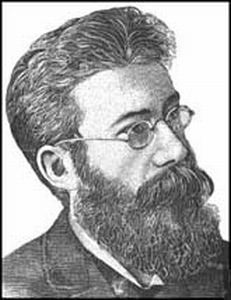Altgeld was the governor of Illinois who pardoned Neebe, Schwab and Fielden in 1893. He was born in Germany and brought to the United States as an infant and grew up on a farm in Ohio, enlisted in the Union army at sixteen, and then studied law after the Civil War. He became a state's attorney, then judge of the Superior Court in Chicago. He made his fortune in Chicago real estate. He was a man of liberal views who was not afraid to voice his convictions. Finally, in 1893 he was elected governor and pardoned the remaining anarchists. After the famous pardons, he was not reelected, but he remained politically active. He even wrote the Democratic platform for the national election of 1896.
Spies was born in Germany and emigrated to America in 1872. In 1875 he became interested in leftist politics and by 1880 was a leader of the Chicago school of anarchism. Also in that year he became the editor of the Arbeiter Zeitung. Despite his extremist persona, it seems certain that Spies was not involved in any bombing plot. He even tried to keep the May strikes in Chicago from becoming destructive confrontations. He did, however, write and circulate the "Revenge." He also corresponded with John Most about dynamite and spoke at the Haymarket meeting. This was enough to involve him in the alleged plot, and he was executed.
Albert Richard Parsons (1848-1887)
Descendant of a noted New England family, Parsons was born in Alabama and raised in Texas. In the Civil War, he served as a confederate soldier in the cavalry commanded by his brother, Maj. Gen. William H. Parsons. After the war, he abjured his Confederate ideas, served in the Reconstruction government of Texas, then went to Chicago and became a labor leader. He rejected conventional political action and became an anarchist. Parsons was one of the speakers at the Haymarket meeting and had left well before the explosion. He evaded arrest, but joined his comrades in the courtroom on the first day of the trial, which cost him his life.
Fisher was born in Bremen, Germany and emigrated to America in 1873 and became a typesetter for the Arbeiter Zeitung. He was a fanatical anarchist, and it seems that he did all he could do to stir up violence during the events in May. He was the author of the summons instructing the workers to attend the Haymarket meeting armed. Fisher was executed.
Engel emigrated to America from Germany in 1873. He first became interested in socialism in Chicago. Another defendant called Engel an "out and out militarist." Engel's only involvement with the Haymarket "Conspiracy" was his attendance at the Grief Hall meeting; he did not attend the Haymarket meeting. He was executed.
Lingg was born in Germany and was the youngest of the eight accused. He came to America in 1885 and became an outspoken advocate of anarchist violence. He was a bomb maker and had distributed bombs on May 4th. He was among the five condemned to death, but first took his own life in his jail cell.
He was born in New York City and was not a fanatical anarchist. He did know the people in the movement, but evidence against him was negligible and he was not even at the Haymarket. Neebe was sentenced to jail for 15 years, and served six before being pardoned.
Fieldon was the only Englishman among the defendants. He was one of the speakers at the Haymarket. The bombing took place at the end of his speech and he was wounded by a bullet while leaving the scene. Fieldon was sentenced to death but was reprieved and was released after serving six years.
Schwab was born in Bavaria and became a socialist early in life. He was the chief editorial assistant on the Arbeiter Zeitung. There was not much evidence against him; he was only at the Haymarket for a few minutes, but a witness claimed to have seen him with Spies and Schnaubelt ( the alleged bombthrower). Schwab was sentenced to death, but the sentence was commuted. He served six years and was pardoned.
These materials were prepared as part of a class assignment for The Seminar in Famous Trials course at the University of Missouri-K.C. School of Law. The use of any sound or images in the trials sites is in furtherance of the educational mission of the Seminar.









